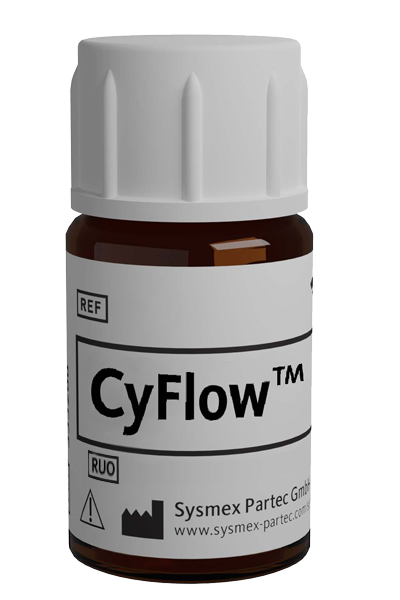CyFlow™ CD14 Alexa Fluor™ 700

| Alternative Name: | LPS-R |
| Antibody: | Yes |
| Antigen: | CD14 |
| Application: | Flow cytometry |
| Clonality: | monoclonal |
| Clone: | MEM-18 |
| Emission Maximum: | 723 nm |
| Excitation Maximum: | 702 nm |
| Field of Interest: | Immunophenotyping |
| Format/Fluorochrome: | Alexa Fluor™ 700 |
| Isotype: | IgG1 |
| Laser: | Red |
| Regulatory Status: | RUO |
| Source Species: | Mouse |
| Target Species: | Human, Non-Human Primates |
| Product number: | CC442562 |
For Research Use Only
| Quantity | 100 tests |
| Volume | 0.4 mL |
| Immunogen | A crude mixture of human urinary proteins precipitated by ammonium sulphate from the urine of a patient suffering from proteinuria |
| Background Information | CD14 (LPS-R) is a 55 kDa GPI-anchored glycoprotein, constitutively expressed on the surface of mature monocytes, macrophages, and neutrophils, where serves as a multifunctional lipopolysaccharide receptor; it is also released to the serum both as a secreted and enzymatically cleaved GPI-anchored form. CD14 binds lipopolysaccharide molecule in a reaction catalyzed by lipopolysaccharide-binding protein (LBP), an acute phase serum protein. The soluble sCD14 is able to discriminate slight structural differences between lipopolysaccharides and is important for neutralization of serum allochthonous lipopolysaccharides by reconstituted lipoprotein particles. |
| Usage | The reagent is designed for Flow Cytometry analysis of human blood cells. Recommended usage is 4·µl reagent·/ 100·µl of whole blood or 10^6 cells in a suspension. The content of a vial (0.4 ml) is sufficient for 100 tests. |
| Storage Buffer | The reagent is provided in stabilizing phosphate buffered saline (PBS) solution, pH ≈7.4, containing 0.09% (w/v) sodium azide. |
| Storage | Avoid prolonged exposure to light. Store in the dark at 2-8°C. Do not freeze. |
| Stability | Do not use after expiration date stamped on vial label. |
| Bazil V, Horejsi V, Baudys M, Kristofova H, Strominger JL, Kostka W, Hilgert I: Biochemical characterization of a soluble form of the 53‑kDa monocyte surface antigen. Eur J Immunol. 1986 Dec; 16(12):1583‑9. < PMID: 3493149 > | McMichael AJ, Beverley PCL, Cobbold S, et al (Eds): Leucocyte Typing III, White Cell Differentiation Antigens. Oxford University Press, Oxford. 1987; 1‑1050. < NLM ID: 8913266 > | Knapp W, Dorken B, Gilks W, Rieber EP, Schmidt RE, Stein H, von dem Borne AEGK (Eds): Leucocyte Typing IV. Oxford University Press, Oxford. 1989; 1‑1820. < NLM ID: 8914679 > | Bazil V, Baudys M, Hilgert I, Stefanova I, Low MG, Zbrozek J, Horejsi V: Structural relationship between the soluble and membrane‑bound forms of human monocyte surface glycoprotein CD14. Mol Immunol. 1989 Jul; 26(7):657‑62. < PMID: 2779588 > | Doussis IA, Gatter KC, Mason DY: CD68 reactivity of non‑macrophage derived tumours in cytological specimens. J Clin Pathol. 1993 Apr; 46(4):334‑6. < PMID: 7684403 > | Juan TS, Hailman E, Kelley MJ, Wright SD, Lichenstein HS: Identification of a domain in soluble CD14 essential for lipopolysaccharide (LPS) signaling but not LPS binding. J Biol Chem. 1995 Jul 21; 270(29):17237‑42. < PMID: 7542233 > | Kishimoto T, Goyert S, Kikutani H, Mason D, Miyasaka M, Moretta L, Ohno T, Okumura K, Shaw S, Springer TA, Sugamura K, Sugawara H, von dem Borne AEGK, Zola H (Eds): Leucocyte Typing VI. Garland Publishing Inc, New York. 1997; 1‑1342. < NLM ID: 9712219 > | Funda DP, Tucková L, Farré MA, Iwase T, Moro I, Tlaskalová-Hogenová H: CD14 is expressed and released as soluble CD14 by human intestinal epithelial cells in vitro: lipopolysaccharide activation of epithelial cells revisited. Infect Immun. 2001 Jun; 69(6):3772‑81. < PMID: 11349042 > | Stöckl J, Majdic O, Fischer G, Maurer D, Knapp W: Monomorphic molecules function as additional recognition structures on haptenated target cells for HLA‑A1‑restricted, hapten‑specific CTL. J Immunol. 2001 Sep 1; 167(5):2724‑33. < PMID: 11509616 > | Sing A, Rost D, Tvardovskaia N, Roggenkamp A, Wiedemann A, Kirschning CJ, Aepfelbacher M, Heesemann J: Yersinia V‑antigen exploits toll‑like receptor 2 and CD14 for interleukin 10‑mediated immunosuppression. J Exp Med. 2002 Oct 21; 196(8):1017‑24. < PMID: 12391013 > | Fernández-Real JM, Broch M, Richart C, Vendrell J, López-Bermejo A, Ricart W: CD14 monocyte receptor, involved in the inflammatory cascade, and insulin sensitivity. J Clin Endocrinol Metab. 2003 Apr; 88(4):1780‑4. < PMID: 12679473 > | Iwaki D, Nishitani C, Mitsuzawa H, Hyakushima N, Sano H, Kuroki Y: The CD14 region spanning amino acids 57‑64 is critical for interaction with the extracellular Toll‑like receptor 2 domain. Biochem Biophys Res Commun. 2005 Mar 4; 328(1):173‑6. < PMID: 15670766 > | Drbal K, Moertelmaier M, Holzhauser C, Muhammad A, Fuertbauer E, Howorka S, Hinterberger M, Stockinger H, Schütz GJ: Single‑molecule microscopy reveals heterogeneous dynamics of lipid raft components upon TCR engagement. Int Immunol. 2007 May; 19(5):675‑84. < PMID: 17446208 > | Angel CE, Lala A, Chen CJ, Edgar SG, Ostrovsky LL, Dunbar PR: CD14+ antigen‑presenting cells in human dermis are less mature than their CD1a+ counterparts. Int Immunol. 2007 Nov; 19(11):1271‑9. < PMID: 17804688 > | Lodrup Carlsen KC, Granum B: Soluble CD14: role in atopic disease and recurrent infections, including otitis media. Curr Allergy Asthma Rep. 2007 Nov; 7(6):436‑43. < PMID: 17986374 > | Asai Y, Makimura Y, Kawabata A, Ogawa T: Soluble CD14 discriminates slight structural differences between lipid as that lead to distinct host cell activation. J Immunol. 2007 Dec 1; 179(11):7674‑83. < PMID: 18025213 > | Weiss TS, Lichtenauer M, Kirchner S, Stock P, Aurich H, Christ B, Brockhoff G, Kunz-Schughart LA, Jauch KW, Schlitt HJ, Thasler WE: Hepatic progenitor cells from adult human livers for cell transplantation. Gut. 2008 Aug; 57(8):1129‑38. < PMID: 18417531 >
